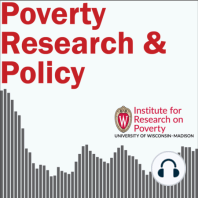22 min listen

Amy Castro On Early Results From Guaranteed Income Programs
Amy Castro On Early Results From Guaranteed Income Programs
ratings:
Length:
35 minutes
Released:
Dec 15, 2021
Format:
Podcast episode
Description
For this episode of the Poverty Research and Policy Podcast, we hear from Professor Amy Castro about the concept of Basic Income, and what she and her team are learning from data coming in from pilot projects around the country. Professor Castro is Founding Director of the Center for Guaranteed Income Research and an Assistant Professor of Social Policy and Practice at the University of Pennsylvania. --- Transcript: Judith Siers-Poisson: Hello, and thanks for joining us for the poverty research and policy podcast from the Institute for research on poverty at the university of Wisconsin-Madison. I'm Judith Siers-Poisson. For this episode we are going to be talking with Professor Amy Castro about the concept of Basic Income, and what she and her team are learning from data coming in from pilot projects around the country. Professor Castro is Founding Director of the Center for Guaranteed Income Research and an Assistant Professor of Social Policy and Practice at the University of Pennsylvania. Professor Castro, Thanks for joining us today. Amy Castro: Thanks for having me. Siers-Poisson: What do we mean when we talk about a guaranteed income? What is it and what is it not? Castro: Yeah, it's a great question because there's a lot of terms that are floating out there in the public imagination that also in the literature. So, there's three basic terms that pertain to this body of work. First is UBI or Universal Basic Income, and that's the one that people are probably the most familiar with given Andrew Yang's presidential run. UBI is exactly what it sounds like. It's universal. It's an unconditional amount of cash that goes to every single person in a city, a state, a town, a county, whatever that jurisdiction may be. We actually have not had a UBI experiment here in the United States because obviously universality know would apply to everybody. We have not had that yet. Second is basic income. Basic income is again an unconditional amount of cash that is given to a group of people, and it's enough to cover your basic needs. The third category, which is primarily what I study, is guaranteed income. It's not enough money to cover your basic needs but is a fixed amount of cash that's recurring, so you can rely on that money coming each month each week, whatever that cadence may be. And I think that's key about all three of these categories. A characteristic that carries across all is the unconditional nature of it, meaning you receive that cash because you're human, you don't receive that cash because you fit a means test criteria or because you are doing something like participating in a workforce force training program or a financial literacy program. You receive that cash because you are because you exist. And that's really the ethos behind guaranteed income or basic income. Siers-Poisson: And it seems like that point is what distinguishes it from, say, what people used to lump under the umbrella of welfare in the past. Castro: Exactly. And I think that that's why, you know, on the one hand, people are so excited about this idea. And then on the other hand, why there is so much backlash, right, is that we truly are talking about giving away money, no strings attached. And traditionally here in the United States, when we talk about the provision of cash or goods to people who are struggling to make ends meet, we layer it with all sorts of restrictions as to how that money can be spent and who can have access to it. And what's attached to those restrictions are social constructions ideas that are not rooted in reality, they’re rooted in ideology most of the time around race, class, gender, marital status. And they're used as ways to shame and blame people who access these programs. And it really serves as a social deterrent for people to access them. In contrast, basic income or guaranteed income functions completely differently. If you're enrolled in one of these programs or pilots, you receive it because you're human. And the
Released:
Dec 15, 2021
Format:
Podcast episode
Titles in the series (100)
Maria Cancian On Changing Families And Changing Child Support Policies: In this podcast episode, University of Wisconsin–Madison Professor of Public Affairs and Social Work Maria Cancian talks about the changing demographics of U.S. families and the challenges this creates for the child support system. by Poverty Research & Policy